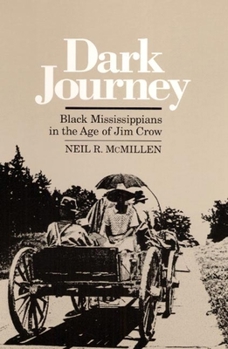Dark Journey Black Mississippians in the Age of Jim Crow
Select Format
Select Condition 
Book Overview
"Remarkable for its relentless truth-telling, and the depth and thoroughness of its investigation, for the freshness of its sources, and for the shock power of its findings. Even a reader who is not unfamiliar with the sources and literature of the subject can be jolted by its impact."--C. Vann Woodward, New York Review of Books "Dark Journey is a superb piece of scholarship, a book that all students of southern and African-American...
Format:Paperback
Language:English
ISBN:025206156X
ISBN13:9780252061561
Release Date:September 1990
Publisher:University of Illinois Press
Length:464 Pages
Weight:1.40 lbs.
Dimensions:1.0" x 6.0" x 9.0"
Customer Reviews
3 ratings
Magisterial
Published by Thriftbooks.com User , 14 years ago
Slavery by Another Name and Black Prisoners and Their World left me with the impression that Alabama was easily the worst state a black person could have lived in after the Civil War (not that any of them, and especially not any of the southern ones, were in the least bit hospitable). Dark Journey dispelled that notion thoroughly. Neil McMillen does a magnificent job in showing how extremely repressive Mississippi was of black people (and helped me to understand why Mississippi, and not some other ex-Confederate state, gave rise to this documentary). His research is impeccable and his presentation broad in scope. I do wonder why he ends his inquiry at 1940, however. He gives no reason--and certainly no good reason--for doing so. I mean, what he terms black Mississippians' "dark journey" certainly did not end in that year. Another criticism: For some reason, McMillen posits three stages to the "dark journey," but his divisions seemed arbitrary and unhelpful to me--particularly considering, again, that he fails to discuss developments post-1940. That said, Dark Journey is terrific history and I highly recommend it to all, and especially to anyone interested in the post-Reconstruction South.
The shameful past of Mississippi
Published by Thriftbooks.com User , 22 years ago
Neil McMillen gives us a look at the real effects of Jim Crow in Dark Journey, the story of white supremacy in Mississippi in the late 19th and early 20th centuries. McMillen explores this society of racial apartheid from the vantage point of the oppressor and the oppressed, for as he states in his preface, "until historians adequately explored the exterior forces that operated on the black community there could be no truly adequate histories of the interior life of the people within that community." He includes many descriptions of Mississippi during this "race-haunted" time from blacks themselves, which adds significantly to the texture of McMillen's "bottom up" depiction of how truly repressive the white regime was. What quickly emerges from this straightforward study is a society dominated without question by whites, one in which whites sought to re-establish race relations as they existed prior to the Civil War. They largely succeeded. What strikes the reader forcefully from the beginning of McMillen's book is how insidiously prevalent the system known as Jim Crow was in Mississippi, and how it affected every aspect of black life. Jim Crow did not mean that blacks were simply in effect denied the right to vote and had limited economic opportunities, though to be sure both of these hurdles existed. White supremacy, as McMillen deftly points out, meant far more than denied voting rights and low-rung jobs. It meant (either de facto or de jury) poor or no high schools, lynchings, outrageous jury verdicts and trials, harassment for succeeding in traditionally white professions, no libraries, etc. The sheer scope and overriding predominance of white supremacy in Mississippi is shocking, especially since whites really did not seek to hide it from prying Northerners. White supremacy transcended class lines for the most part, McMillen show us, and even acted as a greater force upon whites than economic self-interest. For example, every white owner of a store, restaurant, garage, theatre, etc., who refused to serve blacks was also losing the money blacks would have paid them. McMillen concludes that from the 1890s to the middle of the 20th century very few blacks overcame the high political and economic barriers placed in their way by a Mississippi society bent on oppressing them. Blacks in that state, however, managed to create and maintain their own separate political, religious, educational and social institutions despite the odds against them. Those who could, moved away from Mississippi, much like the oppressed and degraded Irish left their native island to escape the shackles of British economic and sectarian control. Truly, Mississippi's society was born of hatred of blacks by whites, a situation not totally eradicated by the Civil Rights movement of the 1960s.
Thorough yet an easy read
Published by Thriftbooks.com User , 24 years ago
Dr. McMillen provides a rare insight into the world of Black Missippians during the 1920s, '30s & 40's. His writing style is a lovely complement to his ingenious insights. He is truly one of our greatest scholars & non-fiction writers. This book is a must-read for anyone even mildy interested in African-American or general Southern history. Black or White this book will help you understand this period in our history. I can't wait for his sequel.




